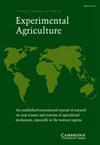改进农业推广方法对技术采用的影响:来自突尼斯农村随机对照试验的证据
IF 1.9
4区 农林科学
Q1 Agricultural and Biological Sciences
引用次数: 0
摘要
突尼斯小农对创新技术的采用程度低且缓慢是一个关键的农业发展问题,部分原因与该国使用的现有技术转让方法有关。本研究的目的是分析如何设计更有效的创新技术转让策略,以提高女性和男性农民对改良大麦品种“Kounouz”的采用,用于小反刍动物营养。采用随机对照试验方法对突尼斯农民实施四种推广处理,并评估其对采用Kounouz的影响。差中差估计表明,集约化农业培训可以显著提高Kounouz的采用。技术培训与经济和组织培训以及赋予妇女权力课程相结合,提高了采用率。这一发现具有重要的政策意义,因为它表明,确保更广泛和公平地采用改进的技术可能不需要改变研究系统,而是需要采取措施,确保妇女更好地获得对性别问题敏感的推广方案,因为这些方案对家庭采用技术有积极影响。本文章由计算机程序翻译,如有差异,请以英文原文为准。
Impact of improved agricultural extension approaches on technology adoption: Evidence from a randomised controlled trial in rural Tunisia
Summary Low and slow adoption of innovative technologies among smallholder farmers in Tunisia is a key agricultural development problem partly related to the existing technology transfer approach used in the country. The objective of this study is to analyse how to design innovative technology transfer strategies more effective in terms of increasing female and male farmers’ adoption of an improved barley variety, ‘Kounouz’, for small ruminant nutrition. A randomised controlled trial method was used with farmers in Tunisia to implement four extension treatments and to evaluate their effects on adoption of Kounouz. Difference-in-difference estimates showed that intensive agricultural trainings can significantly improve adoption of Kounouz. Technical trainings combined with economic and organisational training and female empowerment courses resulted in a higher adoption rate. This finding has important policy implications, because it suggests that ensuring more widespread and equitable adoption of improved technologies may not require changes in the research system, but rather introduction measures that ensure better access for women to gender-sensitive extension programmes given their positive impacts on technology adoption of the household.
求助全文
通过发布文献求助,成功后即可免费获取论文全文。
去求助
来源期刊

Experimental Agriculture
农林科学-农艺学
CiteScore
2.50
自引率
6.20%
发文量
29
审稿时长
24 months
期刊介绍:
With a focus on the tropical and sub-tropical regions of the world, Experimental Agriculture publishes the results of original research on field, plantation and herbage crops grown for food or feed, or for industrial purposes, and on farming systems, including livestock and people. It reports experimental work designed to explain how crops respond to the environment in biological and physical terms, and on the social and economic issues that may influence the uptake of the results of research by policy makers and farmers, including the role of institutions and partnerships in delivering impact. The journal also publishes accounts and critical discussions of new quantitative and qualitative methods in agricultural and ecosystems research, and of contemporary issues arising in countries where agricultural production needs to develop rapidly. There is a regular book review section and occasional, often invited, reviews of research.
 求助内容:
求助内容: 应助结果提醒方式:
应助结果提醒方式:


